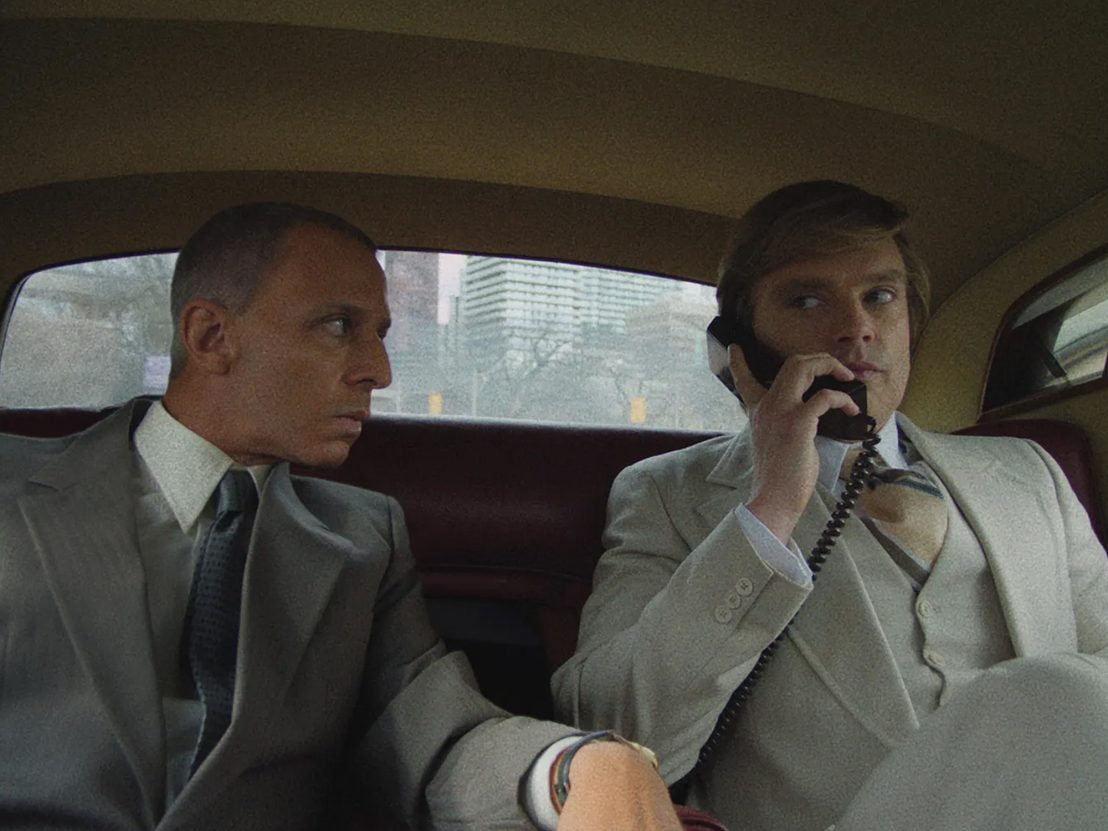
Ali Abbasi's attempted takedown of America's previous (and perhaps next) President of the United States, charting his early years under the mentorship of Roy Cohn, lacks the killer instinct.
Did you know Donald Trump is in Paris Is Burning? No, really: in Jennie Livingston’s seismic documentary on New York’s queer ballroom scene, an independent film about people at the margins, there’s an insert shot of a Forbes magazine cover: “What I Learned in the 80s” is the cover feature, and right underneath it, back row center in an illustration of various one-percenters luminaries, there he is, in between check-ins with Willi Ninja and Venus Xtravaganza.
When Trump was elected President of the United States in 2016, so much of American culture became retrospectively seeded with Easter eggs foreshadowing his eventual ascent to the seat of power; future generations, unlike mine, will have no trouble imagining how this could possibly have happened. For so long Trump was present within discourses on business, crime, race, and politics; he was in Home Alone 2 and had a show on NBC; he was a late-night talk-show punchline and appeared at Wrestlemania. He was so ubiquitous, for so long — how could he not have become President?
The point I want to make here is that there is very little we don’t know about Donald Trump; his rise to the White House was accompanied and indeed fueled by wall-to-wall coverage across all forms of media, which during his (first) term as President enjoyed a boom in readership and revenues — there was always another article breaking another new scandal, or unearthing another embarrassing episode from his past that had been hiding in plain sight all along.
It is, then, very difficult to make a movie that has something new to say about Donald Trump, that tells a new story or shows a new side of the most famous person — probably — you’re not supposed to say this — but they’re saying — many people are saying — he’s the most famous person, frankly, that we’ve ever seen, and we’re seeing him more and more. The task before The Apprentice — a biopic telling the story of Trump’s rise in the New York real estate world in the 70s and 80s, abetted by the notorious fixer Roy Cohn — is therefore a formidable one, and it’s not a task to which director Ali Abbasi and screenwriter Gabriel Sherman prove remotely equal.
The film begins in New York City, in the 70s, at an exclusive members’ club where Trump (Sebastian Stan), the twentysomething son of outerboro slumlord Fred (an unrecognizable Martin Donovan), restlessly narrates the power players in the room to his bored date; Trump is an outsider, a striver, palpably uncomfortable — but there, through a doorway, doing the Kubrick Stare, is Roy Cohn, former Joe McCarthy aide during the the Red Scare of the 1950s and infamous lawyer for mobsters and other power players, publicly revealed after his death from AIDS to be a closeted gay man. Cohn takes an interest in Trump, and smooths the wheels for his first big deal, the overhaul of the old Commodore on Manhattan’s then-decrepit 42nd Street.
For the first hour of the film, Stan’s Trump is, deliberately, not the man we know today: his voice has a slight Queens bray, but he avoids all the caricaturist’s tics, murmurs softly and almost tenderly at times, even when describing his ambitious. Stan plays him as he’s written, nervous and unformed and frankly sympathetic, genuinely drawn to Ivana (Maria Bakalova) for her ambitions, a finicky and unschooled naïf wandering around Cohn’s decadent parties avoiding the drugs and gay sex. He’s a would-be shark so doughy and vague as to be almost sympathetic, like the budding young Nazi collaborator of Louis Malle’s Lacombe, Lucien.
Trump’s relationship with Cohn was widely reported on during his presidency, so much so that Cohn — a figure notorious enough to have been played by James Woods in a TV movie in the 1990s, and Al Pacino in the HBO miniseries of the Pulitzer-winning Angels in America — has been retconned as primarily Trump’s mentor; a feature-length documentary about him is titled Where’s My Roy Cohn?, after an Oval Office lament. So it’s not exactly newsworthy that the film credits Cohn with teaching Trump to affect a brashness and flair and to learn to attack, deny, and dominate the narrative — nor are these particular novel insights into Trump.
The almost sympathetic cast of the film’s first hour is, I suppose, a fresh perspective, but equally an offensive and shallow one, driven less by any particular insight into the perverse incentives of American society — the film is remarkably insular, shot largely on soundstage recreations of the Trump home in Jamaica Estates, the penthouse in Trump Tower, the backs of various limos and the offices of various power brokers — than by the dictates of a character arc in which Cohn and Fred are obviously posited as polar opposite father figures, demanding and competitive men after whom Donald models himself and whose approval he seeks.
A number of things change at the film’s halfway mark. The film switches from a celluloid to a digital look — throughout, Abassi and cinematographer Kasper Tuxen ape the period of the action, from seamy red-tinted narrow-gauge for the gritty 70s to a bleary pixelated look that improves throughout the 80s—a gesture that would give the film an appealing momentum and raw texture were the narrative not so wedded to the historical record, with cutesy cameos from Warhol and Rupert Murdoch, and knowing references to the Trump Tower elevators, MAGA, and other future features of American life. Stock-footage montages exposit the eras’ historical context via potted histories of New York City, with an unclear point of view on the cycle of urban decline and rebirth in the postwar era: though lightly in quotation marks, they also seem objective accounts of a general historical record that gives credence to the narrative of White Flight–era NYC as “Fear City” (an image of lawlessness Trump long exploited, first as a developer and then as a demagogue), and of the go-go Reagan 80s, the decade in which Trump applied all of what he learned in the 70s, and of which he became an avatar.
At this point in the film, Stan’s dialogue takes on the familiar turns of phrase, the verbal and physical mannerisms: the diet pill— the pursed lips, the overenunciation and theatrical hand gestures, the addled mile-a-minute grandiose rants and flippant dismissals and breathtaking glibness and oddly matronly cattiness. It’s funny, but hardly virgin territory the years we’ve spent enjoying the work of comedians like James Austin Johnson and that one friend of yours who sends you voice memos in the Trump voice talking about the discourses of the day, impersonators who reshape the news by pushing the man’s implicit grotesquery and absurdity to the fore.
This Trump gets more flagrantly cruel to Ivana, delusional, thin-skinned and aggressive. It’s the kind of charismatic antihero’s journey that might fly in a Scorsese film — arguably the ultimate Trump film is The Wolf of Wall Street — but Abassi and Sherman’s take on the material is largely dutiful. The soundtrack aspires to an incongruously feel-good high-energy looseness that the film doesn’t back up. I’ve never been unhappier to hear Suicide, Pet Shop Boys or New Order, and the smash cut and needle drop that takes us out of after Trump’s rape of Ivana (a scene from her divorce deposition, staged as literally and luridly as you’d expect from the director of Holy Spider) is especially egregious.
Maybe there’s supposed to be a larger point about Trump’s political movement in the way that he’s shown to abandon Cohn as his former mentor’s legal aides and health woes pile up, but Cohn recedes from the narrative in the second half of the film, which is much less grounded in their relationship; though as Cohn weakens from a virus he steadfastly denied, the second hour is his turn to be portrayed more sympathetically than he deserves.
Strong has the same problem in his performance as Stan, in that Cohn is almost as media-saturated a figure as Trump. Strong gives Cohn a low, aggressive voice, slightly nasal and rounded, with casual and cruel inflections tossed out at a Succession-trained tempo; he bobs his neck up and down like a turtle on each syllable, but holds it forward tentatively as if the muscles are atrophying, as Cohn becomes frailer. It’s a credible performance, not remotely campy, but not really anything — there’s nothing here like the perspective on the role as interpreted by, say, the underground theater legend Ron Vawter in his performance piece Roy Cohn/Jack Smith, in which he gave Cohn a shrill, mincing Jewish voice, flaunting the traits most concealed and loathed by his recently deceased subject.
Recognizable figures are a fun challenge for actors, as well as for the hair, makeup, and wardrobe departments tasked with recreating iconic looks that everyone remembers from recent history. This year, election season is also Oscar-movie season, and you can expect some attention from the crafts teams on The Apprentice and maybe Strong or Sherman (one of the many glossy-magazine journalists to enjoy an elevated profile since the Trump years). I’m sure their acceptance speeches will be full of righteous anger directed at the new administration.
Published 21 May 2024

Ali Abbasi crafts a thriller ripped from the headlines in this story of 'The Spider Killer' who targeted female sex workers in Mashhad, Iran.

By Anton Bitel
A customs officer falls in love with a strange traveller in Ali Abbasi’s twisted modern romance.

By Jack Godwin
The former Vice President turns up the heat in the follow-up to his award-winning climate change doc.